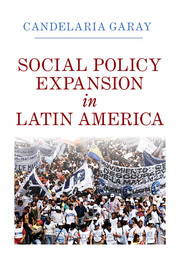26 results
13 - Redefining Labor Organizing
- from Part IV - Symbolic Power: Identities and Social Protest
-
-
- Book:
- State and Nation Making in Latin America and Spain
- Published online:
- 03 August 2023
- Print publication:
- 17 August 2023, pp 411-427
-
- Chapter
- Export citation
Property Threats and the Politics of Anti-Statism: The Historical Roots of Contemporary Tax Systems in Latin America. By Gabriel Ondetti. New York: Cambridge University Press, 2021. 300p. $99.99 cloth.
-
- Journal:
- Perspectives on Politics / Volume 20 / Issue 1 / March 2022
- Published online by Cambridge University Press:
- 09 March 2022, pp. 349-350
- Print publication:
- March 2022
-
- Article
- Export citation
2 - Including Outsiders in Latin America
- from Part I - Extending Social Policy and Participation
-
-
- Book:
- The Inclusionary Turn in Latin American Democracies
- Published online:
- 12 January 2021
- Print publication:
- 04 February 2021, pp 59-92
-
- Chapter
- Export citation
8 - A Multilevel Approach to Enforcement
-
-
- Book:
- The Politics of Institutional Weakness in Latin America
- Published online:
- 06 May 2020
- Print publication:
- 11 June 2020, pp 183-207
-
- Chapter
- Export citation
5 - Social Mobilization and Inclusive Social Policy in Argentina
-
- Book:
- Social Policy Expansion in Latin America
- Published online:
- 26 January 2017
- Print publication:
- 29 December 2016, pp 165-221
-
- Chapter
- Export citation
Tables
-
- Book:
- Social Policy Expansion in Latin America
- Published online:
- 26 January 2017
- Print publication:
- 29 December 2016, pp viii-viii
-
- Chapter
- Export citation
3 - The Social Policy Divide in Latin America
-
- Book:
- Social Policy Expansion in Latin America
- Published online:
- 26 January 2017
- Print publication:
- 29 December 2016, pp 79-119
-
- Chapter
- Export citation

Social Policy Expansion in Latin America
-
- Published online:
- 26 January 2017
- Print publication:
- 29 December 2016
Appendix 1 - Measuring Outsiders, Social Policy, and Data Sources
-
- Book:
- Social Policy Expansion in Latin America
- Published online:
- 26 January 2017
- Print publication:
- 29 December 2016, pp 339-344
-
- Chapter
- Export citation
1 - Including Outsiders in Latin America
-
- Book:
- Social Policy Expansion in Latin America
- Published online:
- 26 January 2017
- Print publication:
- 29 December 2016, pp 1-27
-
- Chapter
- Export citation
Copyright page
-
- Book:
- Social Policy Expansion in Latin America
- Published online:
- 26 January 2017
- Print publication:
- 29 December 2016, pp iv-iv
-
- Chapter
- Export citation
8 - Social Policy Expansion in Comparative Perspective
-
- Book:
- Social Policy Expansion in Latin America
- Published online:
- 26 January 2017
- Print publication:
- 29 December 2016, pp 299-338
-
- Chapter
- Export citation
Contents
-
- Book:
- Social Policy Expansion in Latin America
- Published online:
- 26 January 2017
- Print publication:
- 29 December 2016, pp v-v
-
- Chapter
- Export citation
Index
-
- Book:
- Social Policy Expansion in Latin America
- Published online:
- 26 January 2017
- Print publication:
- 29 December 2016, pp 387-393
-
- Chapter
- Export citation
Bibliography
-
- Book:
- Social Policy Expansion in Latin America
- Published online:
- 26 January 2017
- Print publication:
- 29 December 2016, pp 359-386
-
- Chapter
- Export citation
Appendices
-
- Book:
- Social Policy Expansion in Latin America
- Published online:
- 26 January 2017
- Print publication:
- 29 December 2016, pp 339-358
-
- Chapter
- Export citation
7 - Electoral Competition for Outsiders, Conservative Power, and Restrictive Social Policy in Chile
-
- Book:
- Social Policy Expansion in Latin America
- Published online:
- 26 January 2017
- Print publication:
- 29 December 2016, pp 261-298
-
- Chapter
- Export citation
6 - Electoral Competition for Outsiders, Conservative Power, and Restrictive Social Policy in Mexico
-
- Book:
- Social Policy Expansion in Latin America
- Published online:
- 26 January 2017
- Print publication:
- 29 December 2016, pp 222-260
-
- Chapter
- Export citation
Interviews
-
- Book:
- Social Policy Expansion in Latin America
- Published online:
- 26 January 2017
- Print publication:
- 29 December 2016, pp 353-358
-
- Chapter
- Export citation
4 - Social Mobilization, Electoral Competition for Outsiders, and Inclusive Social Policy in Brazil
-
- Book:
- Social Policy Expansion in Latin America
- Published online:
- 26 January 2017
- Print publication:
- 29 December 2016, pp 120-164
-
- Chapter
- Export citation



